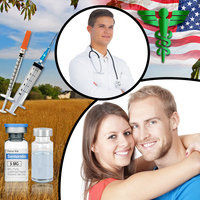Introduction to Genotropin
Genotropin, a recombinant human growth hormone, has emerged as a pivotal treatment for individuals grappling with growth hormone deficiency (GHD). This condition can be particularly challenging for survivors of childhood cancer, where the disease or its treatment may impair the body's natural production of growth hormone. Genotropin offers a beacon of hope, enabling these survivors to achieve more normal growth patterns and improve their quality of life.
The Impact of Childhood Cancer on Growth
Childhood cancer survivors often face a myriad of long-term health issues, one of which can be GHD. The treatments for cancer, such as radiation and chemotherapy, can damage the pituitary gland, the small but mighty organ responsible for secreting growth hormone. This damage can lead to stunted growth, delayed puberty, and a host of psychological challenges stemming from the physical differences these survivors may experience compared to their peers.
Genotropin's Role in Managing GHD
Genotropin steps in as a synthetic substitute for the growth hormone that the body can no longer produce in adequate amounts. Administered through daily injections, Genotropin mimics the natural growth hormone's effects, promoting growth in height, increasing muscle mass, and enhancing overall body composition. For American males who have survived childhood cancer, this treatment can be a critical component in their journey towards physical normalcy and emotional well-being.
Clinical Evidence Supporting Genotropin
Clinical studies have underscored the efficacy of Genotropin in treating GHD among childhood cancer survivors. Research has shown that those treated with Genotropin experience significant improvements in growth velocity and final adult height. Moreover, the treatment has been associated with positive metabolic changes, including better bone density and lipid profiles, which are crucial for long-term health.
Safety Profile and Monitoring
While Genotropin is generally well-tolerated, its use requires careful monitoring by healthcare professionals. Potential side effects can include injection site reactions, headaches, and fluid retention. Regular check-ups are essential to adjust dosages and monitor for any adverse effects. For American males on this therapy, maintaining open communication with their healthcare team is vital to ensure the treatment's safety and effectiveness.
Psychological and Social Considerations
The psychological impact of GHD and its treatment cannot be overstated. American males who have survived childhood cancer may struggle with self-esteem issues related to their stature and physical development. Genotropin can play a role in alleviating some of these concerns by helping them achieve a more typical growth trajectory. Support from family, friends, and mental health professionals is also crucial in navigating the emotional landscape of GHD and its treatment.
The Importance of a Multidisciplinary Approach
Managing GHD in childhood cancer survivors is a complex endeavor that benefits from a multidisciplinary approach. Endocrinologists, oncologists, psychologists, and nutritionists often work together to tailor a comprehensive care plan. For American males, this team-based approach ensures that all aspects of their health—physical, emotional, and psychological—are addressed in a holistic manner.
Conclusion: A Step Towards Normalcy
Genotropin represents more than just a medical treatment; it is a step towards normalcy for American males who have faced the daunting challenge of childhood cancer. By addressing the physical manifestations of GHD, Genotropin helps these survivors reclaim a sense of control over their bodies and their futures. As research continues to evolve, the hope is that treatments like Genotropin will become even more effective, offering an even brighter outlook for those who have bravely battled cancer in their youth.
Contact Us For A Fast And Professional Response

- Genotropin's Impact on Lipid Profiles in American Men with Growth Hormone Deficiency [Last Updated On: February 24th, 2025] [Originally Added On: February 24th, 2025]
- Unveiling the Potential of Genotropin: A Comprehensive Review of Clinical Trials and Outcomes [Last Updated On: March 3rd, 2025] [Originally Added On: March 3rd, 2025]
- Exploring the Impact of Genotropin on Metabolic Health in American Adult Males [Last Updated On: March 12th, 2025] [Originally Added On: March 12th, 2025]
- Unveiling the Potential of Genotropin in Managing Idiopathic Short Stature Among American Males [Last Updated On: March 15th, 2025] [Originally Added On: March 15th, 2025]
- Unveiling the Synergy: Genotropin's Role in Treating Growth Hormone Deficiency Amidst Sleep Disorders [Last Updated On: March 16th, 2025] [Originally Added On: March 16th, 2025]
- Unveiling the Respiratory Benefits of Genotropin in Growth Hormone Deficient Males [Last Updated On: March 16th, 2025] [Originally Added On: March 16th, 2025]
- Exploring the Therapeutic Potential of Genotropin in Treating Growth Hormone Deficiency and Osteoporosis in American Males [Last Updated On: March 16th, 2025] [Originally Added On: March 16th, 2025]
- Unleashing Potential: Genotropin's Impact on Exercise Capacity in Growth Hormone Deficient American Males [Last Updated On: March 16th, 2025] [Originally Added On: March 16th, 2025]
- Unlocking the Potential of Genotropin Therapy: Overcoming Psychological Barriers in American Males [Last Updated On: March 16th, 2025] [Originally Added On: March 16th, 2025]
- Exploring the Impact of Genotropin on Bladder Function in American Males with Growth Hormone Deficiency [Last Updated On: March 16th, 2025] [Originally Added On: March 16th, 2025]
- Genotropin: Enhancing Life Quality in Adults with Childhood-Onset Growth Hormone Deficiency [Last Updated On: March 17th, 2025] [Originally Added On: March 17th, 2025]
- Genotropin's Impact on Cardiovascular Health in American Males with Growth Hormone Deficiency [Last Updated On: March 17th, 2025] [Originally Added On: March 17th, 2025]
- Genotropin's Role in Enhancing Intestinal Adaptation for Short Bowel Syndrome Treatment [Last Updated On: March 18th, 2025] [Originally Added On: March 18th, 2025]
- Genotropin Therapy Transition: From Pediatric to Adult Care for American Males [Last Updated On: March 18th, 2025] [Originally Added On: March 18th, 2025]
- Strategies to Enhance Genotropin Therapy Compliance in American Males with GHD [Last Updated On: March 19th, 2025] [Originally Added On: March 19th, 2025]
- Genotropin's Efficacy in Treating Growth Disorders in American Males: A Comprehensive Review [Last Updated On: March 19th, 2025] [Originally Added On: March 19th, 2025]
- Genotropin: Understanding Pharmacokinetics and Pharmacodynamics for Growth Hormone Deficiency Treatment [Last Updated On: March 20th, 2025] [Originally Added On: March 20th, 2025]
- Genotropin Enhances Cognitive Function in American Males with Growth Hormone Deficiency [Last Updated On: March 20th, 2025] [Originally Added On: March 20th, 2025]
- Genotropin: Enhancing Elderly Men's Vitality with Growth Hormone Therapy [Last Updated On: March 20th, 2025] [Originally Added On: March 20th, 2025]
- Genotropin: Enhancing Growth in SGA Children and Improving Quality of Life [Last Updated On: March 20th, 2025] [Originally Added On: March 20th, 2025]
- Genotropin: Revolutionizing Hypopituitarism Treatment for American Males [Last Updated On: March 21st, 2025] [Originally Added On: March 21st, 2025]
- Debunking Myths: Understanding Genotropin Therapy for American Males [Last Updated On: March 21st, 2025] [Originally Added On: March 21st, 2025]
- Genotropin Enhances Immune Function in Growth Hormone Deficient American Males [Last Updated On: March 22nd, 2025] [Originally Added On: March 22nd, 2025]
- Genotropin Therapy for American Males: Benefits, Side Effects, and Management Strategies [Last Updated On: March 22nd, 2025] [Originally Added On: March 22nd, 2025]
- Genotropin: Effective Treatment for Growth Hormone Deficiency Due to Genetic Mutations [Last Updated On: March 22nd, 2025] [Originally Added On: March 22nd, 2025]
- Genotropin Therapy: Enhancing Growth in American Males with GHD [Last Updated On: March 23rd, 2025] [Originally Added On: March 23rd, 2025]
- Genotropin: Cost-Effective GHD Treatment for American Males [Last Updated On: March 23rd, 2025] [Originally Added On: March 23rd, 2025]
- Genotropin: Enhancing Growth and Quality of Life in Cystic Fibrosis Patients with GHD [Last Updated On: March 23rd, 2025] [Originally Added On: March 23rd, 2025]
- Genotropin's Efficacy in Treating GHD Post-TBI in American Males: A Review [Last Updated On: March 24th, 2025] [Originally Added On: March 24th, 2025]
- Genotropin Enhances Skin Health in American Men with Growth Hormone Deficiency [Last Updated On: March 24th, 2025] [Originally Added On: March 24th, 2025]
- Genotropin's Impact on Growth Hormone Deficiency in American Males with Down Syndrome [Last Updated On: March 24th, 2025] [Originally Added On: March 24th, 2025]
- Genotropin's Role in Managing Growth Hormone Deficiency and Diabetes: Efficacy and Safety [Last Updated On: March 24th, 2025] [Originally Added On: March 24th, 2025]
- Genotropin Therapy: Enhancing Growth and Well-being in American Males [Last Updated On: March 24th, 2025] [Originally Added On: March 24th, 2025]
- Genotropin Therapy: Long-Term Outcomes and Care for American Males with GHD [Last Updated On: March 24th, 2025] [Originally Added On: March 24th, 2025]
- Genotropin: A Vital Treatment for Growth Hormone Deficiency from Pituitary Tumors in Males [Last Updated On: March 24th, 2025] [Originally Added On: March 24th, 2025]
- Genotropin: A Vital Treatment for Growth Hormone Deficiency in American Males [Last Updated On: March 25th, 2025] [Originally Added On: March 25th, 2025]
- Genotropin's Impact on Growth in American Males with Sickle Cell and GHD [Last Updated On: March 25th, 2025] [Originally Added On: March 25th, 2025]
- Genotropin's Impact on Emotional Well-being in American Males with GHD [Last Updated On: March 25th, 2025] [Originally Added On: March 25th, 2025]
- Genotropin's Multifaceted Benefits for American Males with Turner Syndrome [Last Updated On: March 25th, 2025] [Originally Added On: March 25th, 2025]
- Genotropin: Managing Growth Hormone Deficiency in American Males Post-Radiation Therapy [Last Updated On: March 25th, 2025] [Originally Added On: March 25th, 2025]
- Genotropin Enhances Sleep Quality in American Men with Growth Hormone Deficiency [Last Updated On: March 25th, 2025] [Originally Added On: March 25th, 2025]
- Genotropin's Impact on Reproductive Health in American Males with GHD [Last Updated On: March 26th, 2025] [Originally Added On: March 26th, 2025]
- Genotropin: Enhancing Body Composition and Health in American Males with GHD [Last Updated On: March 26th, 2025] [Originally Added On: March 26th, 2025]
- Genotropin's Impact on Dental Health in American Males with Growth Hormone Deficiency [Last Updated On: March 26th, 2025] [Originally Added On: March 26th, 2025]
- Genotropin's Efficacy in Treating GHD and RA in American Males: Benefits and Considerations [Last Updated On: March 27th, 2025] [Originally Added On: March 27th, 2025]
- Genotropin Enhances Exercise Capacity in American Males with Growth Hormone Deficiency [Last Updated On: March 27th, 2025] [Originally Added On: March 27th, 2025]
- Genotropin Therapy Transition Strategies for American Males with Growth Hormone Deficiency [Last Updated On: March 28th, 2025] [Originally Added On: March 28th, 2025]
- Genotropin's Potential Benefits on Hearing in American Boys with Growth Hormone Deficiency [Last Updated On: March 28th, 2025] [Originally Added On: March 28th, 2025]
- Genotropin's Role in Managing Growth Hormone Deficiency in HIV-Positive American Males [Last Updated On: March 28th, 2025] [Originally Added On: March 28th, 2025]
- Genotropin Therapy for American Males: Nutritional Strategies for Optimal Growth and Health [Last Updated On: March 28th, 2025] [Originally Added On: March 28th, 2025]
- Strategies to Enhance Genotropin Therapy Adherence in American Adolescent Males [Last Updated On: March 28th, 2025] [Originally Added On: March 28th, 2025]
- Genotropin Therapy: Enhancing Life Quality for American Males with Growth Hormone Deficiency [Last Updated On: March 28th, 2025] [Originally Added On: March 28th, 2025]
- Genotropin's Impact on American Males with GHD and ASD: Efficacy and Considerations [Last Updated On: March 28th, 2025] [Originally Added On: March 28th, 2025]
- Genotropin Therapy for GHD in American Males with Epilepsy: Benefits and Risks [Last Updated On: March 28th, 2025] [Originally Added On: March 28th, 2025]
- Genotropin's Impact on Vision in American Males with Growth Hormone Deficiency [Last Updated On: March 28th, 2025] [Originally Added On: March 28th, 2025]
- Genotropin's Efficacy in Treating GHD in American Males with Asthma [Last Updated On: March 29th, 2025] [Originally Added On: March 29th, 2025]
- Overcoming Psychological Barriers to Genotropin Therapy in American Males [Last Updated On: March 30th, 2025] [Originally Added On: March 30th, 2025]
- Genotropin's Impact on Hair Growth in American Men with Growth Hormone Deficiency [Last Updated On: March 30th, 2025] [Originally Added On: March 30th, 2025]
- Genotropin's Impact on Kidney Function in American Males with Growth Hormone Deficiency [Last Updated On: March 31st, 2025] [Originally Added On: March 31st, 2025]

















